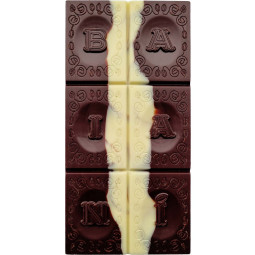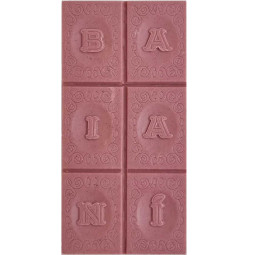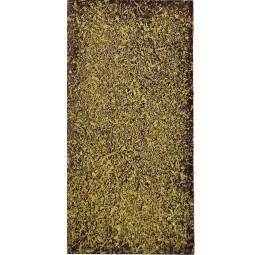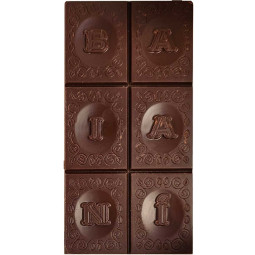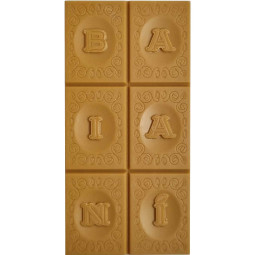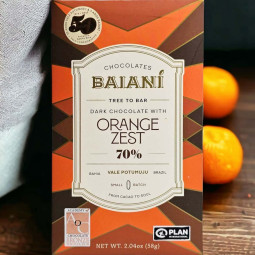Chocolates Baiani - Basilian Chocolates Tree to Bar
Juliana and Tuta Aquino are the owners of Fazenda Santa Rita - Vale Potumuju. Join us on a journey of discovery to Baiani Chocolates, one of the world's renowned chocolate makers - and get ready for some of the most delicious chocolates you've ever tasted!

The state of Bahia on the Atlantic coast of Brazil is home to a charming chocolate maker with a rich history and a passion for producing some of Brazil's most exquisite chocolates. Baiani Chocolates is a family business that dates back to the late 19th century when their ancestors started growing cocoa. Today, their chocolates are known for their unique taste and high quality, due in part to the exclusive use of carefully selected cocoa beans grown using modern agricultural techniques. The company's motto "From Farm to Bar" underlines its commitment to maintaining authenticity throughout the production process. These bars offer an unadulterated taste of Brazil's finest artisanal (craft) Chocolate. We are therefore always proud to say that Baianí Chocolates is a true tree-to-bar brand.
Sustainability
Sustainability, both socially and environmentally; direct and fair trade between the farmer and the chocolate maker; and the chocolate making process, where the maker uses whole cocoa beans and develops its own recipes. The cacao is cultivated in the cabruca way, a traditional cultivation method that has been practiced in Brazil for 200 years. It can be seen as the predecessor of today's agroforestry systems (a cultivation system that combines elements of arable farming with forestry). Here, the cocoa plants grow in the shade of the rainforest. The giant trees are not felled, only small clearings are created to allow the cocoa saplings to grow in an intact ecosystem. This means that no artificial irrigation system is necessary and the nutritious rainforest soil makes fertilizing with chemicals unnecessary. The plants are also much more resistant to pests and disease. The traditional cultivation method also offers protection to many plant and animal species, such as the golden-headed tamarin, which is much more common in a cabruca forest.
A brand is called Tree to Bar when all the pillars of the Bean to Bar process are adhered to and controlled by the same company. This means that one and the same team performs all the alchemy to obtain the chocolate flavors, from carrying out the agricultural practices on their own farm, including the post-harvest, a key factor in the sensory development of the cacao, to the packaging of the bars.
Cocoa origin
Grown in the shade of the large trees of the Atlantic rainforest.
The agroforestry method, called the cabruca system, has been used since the first settlers cultivated cocoa in Bahia. The trees grow under the canopy and in the shade of the original Atlantic rainforest, a huge nature reserve. Due to the highly developed post-harvest protocols and the high quality of cocoa beans, Juliana began to produce Chocolate from its own cocoa. With success! The BAIANI brand was launched in Brazil and internationally in 2018. I met Juliana in May 2022 in Italy, where we completed the Level 3 course of the IICCT, currently the highest level of the International Institute of Chocolate & Cacao Tasting. I liked Chocolate straight away, but it took a whole two years before it was finally available to buy here.
The makers behind Baiani Chocolates
Juliana Aquino
 Juliana was born in Bahia and spent most of her life in Salvador, where she became a professional singer. She moved to New York to marry her current partner in life and business, Tuta Aquino. She returned to Brazil after solidifying her musical career by promoting Brazilian music abroad and recording two bossa nova albums. In 2015, she graduated from Anhembi-Morumbi University's School of Gastronomy and, together with Tuta, reconnected with her father's Fazenda Santa Rita, where she rekindled her childhood experience of cocoa processing. To confirm the progress made in the post-harvest, Juliana decided to make her own Chocolate, because, as we all know, you only realize the true value of the beans when you taste the bars. After two years of testing, the Chocolate attracted the attention of professionals, which led the Aquino duo to launch their Baianí brand, which is now marketed both inside and outside Brazil.
Juliana was born in Bahia and spent most of her life in Salvador, where she became a professional singer. She moved to New York to marry her current partner in life and business, Tuta Aquino. She returned to Brazil after solidifying her musical career by promoting Brazilian music abroad and recording two bossa nova albums. In 2015, she graduated from Anhembi-Morumbi University's School of Gastronomy and, together with Tuta, reconnected with her father's Fazenda Santa Rita, where she rekindled her childhood experience of cocoa processing. To confirm the progress made in the post-harvest, Juliana decided to make her own Chocolate, because, as we all know, you only realize the true value of the beans when you taste the bars. After two years of testing, the Chocolate attracted the attention of professionals, which led the Aquino duo to launch their Baianí brand, which is now marketed both inside and outside Brazil.
Tuta Aquino
 Tuta was also born in Bahia and spent his first 10 years on a cocoa farm. He lived in São Paulo until he was 18, from where he moved to New York and worked in the music industry for 20 years. He married Juliana, and a few years later the couple returned to Brazil. Although he is still active in music production with his production company DOREMIX, since 2012 Tuta has dedicated much of his time to rebuilding the Santa Rita - Vale Potumuju farm with Juliana, which became unproductive after the devastation caused by an epidemic, the "witches' broom", which decimated cocoa production in Bahia in the 1990s. Tuta was already researching ways to refine the cocoa when he discovered the Bean-To-Bar chocolate market as an alternative way to market the beans. Given the improved productivity and quality of cocoa in the Potumuju Valley, Tuta encouraged Juliana to develop the recipes that are now part of the Baianí range of chocolate bars.
Tuta was also born in Bahia and spent his first 10 years on a cocoa farm. He lived in São Paulo until he was 18, from where he moved to New York and worked in the music industry for 20 years. He married Juliana, and a few years later the couple returned to Brazil. Although he is still active in music production with his production company DOREMIX, since 2012 Tuta has dedicated much of his time to rebuilding the Santa Rita - Vale Potumuju farm with Juliana, which became unproductive after the devastation caused by an epidemic, the "witches' broom", which decimated cocoa production in Bahia in the 1990s. Tuta was already researching ways to refine the cocoa when he discovered the Bean-To-Bar chocolate market as an alternative way to market the beans. Given the improved productivity and quality of cocoa in the Potumuju Valley, Tuta encouraged Juliana to develop the recipes that are now part of the Baianí range of chocolate bars.





